Stumbling around the tubes of the Interwebs, we found the following video, in which Michael Hurst deconstructs the upcoming Bitch Slap, a flick that looks like a most amusing homage to the B-exploitation films we love, with stunt co-ordinator Zoe (Grindhouse) Bell. How can any movie go wrong with Lucy Lawless as a mother superior? For more info, check out the official website. We will, needless to say, be following this one with interest.
Month: September 2008
Silence of the Lambs
★★★★½
“Clarice had a little lamb – Buffalo Bill kills to dress.”
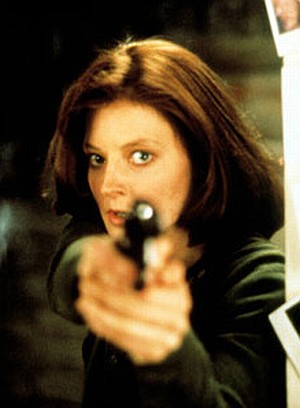
 One of only three films to win the top five Oscars – Best Actor, Actress, Director, Picture and Screenplay [the others being It Happened One Night and One Flew Over the Cuckoo’s Nest] – this is arguably the most critically-acclaimed Girls With Guns film of all time. Foster plays FBI trainee Clarice Starling, sent to interview captive killer Dr. Hannibal Lecter (Hopkins), from where blossoms a strange, symbiotic relationship where both parties need each other. Lecter can help the FBI find an active killer, nicknamed Buffalo Bill because he skins his victims, while Starling is prepared to open herself up, psychologically, to Lecter’s unwavering gaze.
One of only three films to win the top five Oscars – Best Actor, Actress, Director, Picture and Screenplay [the others being It Happened One Night and One Flew Over the Cuckoo’s Nest] – this is arguably the most critically-acclaimed Girls With Guns film of all time. Foster plays FBI trainee Clarice Starling, sent to interview captive killer Dr. Hannibal Lecter (Hopkins), from where blossoms a strange, symbiotic relationship where both parties need each other. Lecter can help the FBI find an active killer, nicknamed Buffalo Bill because he skins his victims, while Starling is prepared to open herself up, psychologically, to Lecter’s unwavering gaze.
The relationship between the two is the engine that drives the picture, and it proves Starling’s strength that she is able to stand up to Lecter, to the extent that he develops a respect for her. That’s an interesting contrast to her colleagues in the agency, such as Jack Crawford (Glenn), with whom Starling has an unending battle to be treated as an equal: her physical lack of size [apparent right from the start, when she is an an elevator and towered over by her fellow trainees] is belied by her smarts and strength of character, which propel her forward when many would give up. It says a lot about Foster’s performance, that it is not entirely overpowered by Hopkins’ one; Lecter is another case of a great British actor portraying evil to perfection [see also, in different ways, Ben Kingsley, Alan Rickman, Ranulph Fiennes and Christopher Lee]. If Buffalo Bill is the ultimate misogynist, despite his desire to be a woman, Lecter is the ultimate boogeyman, punishing, in unspeakable ways, those he deems unworthy.
It’s Lecter that people remember, quote and fear – to the extent that the movie sometimes topples over as the result of his but Starling is the heart of the film, defying convention by being a heroine who has, basically, no romantic side [there seem to me to be vague homoerotic hints, but that may just be the result of subsequent data about Foster]. She doesn’t sleep with anyone: indeed, she doesn’t appear to sleep, with her life outside the FBI Academy barely sketched. Starling is intensely focused on her task, and prepared to go to any lengths to accomplish it. She is pushed beyond her limits in the process, and digs deeper than she ever imagined possible, on a journey into her personal heart of darkness. If occasionally far-fetched [there being no way the FBI would let a trainee gallivant around on a top-level case like this], this is a landmark entry in the genre, with quality performances that have rarely been matched.
Dir: Jonathan Demme
Star: Jodie Foster, Anthony Hopkins, Scott Glenn, Anthony Heald
Devil’s Den
★★★
“The final battle for the soul of mankind will be fought in a bar full of possessed strippers.” Best. Tagline. Ever.
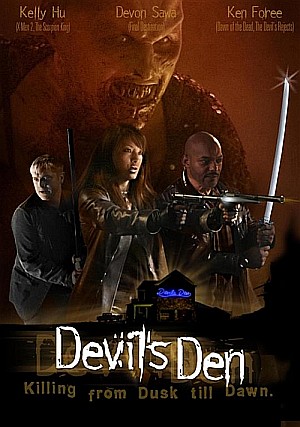 Sadly, despite the above tagline, the movie doesn’t quite live up to expectations. It has some very interesting ideas, but kinda goes about them the wrong way: I love the idea of a government task-force that roams the world, taking out vampires, werewolves, etc. I enjoy the concept of government-sponsored assassins, working on behalf of pissed-off senators. Instead, for the most part, the film wants desperately to be From Dusk Till Dawn – an admirable target, for sure, even if it falls short on almost every level. Vamp is another obvious touchstone for the script, which has Quinn (Sawa) stop off at the titular strip-club on his way back from Mexico, only to find the buffet is of the patrons, not for the patrons. Fortunately, government agent Leonard (Foree) is there too, looking for the queen of the ghouls, and so is Caitlin (Hu), a two-gun lady whose purpose in attending the venue is less clear. Decapitations ensue.
Sadly, despite the above tagline, the movie doesn’t quite live up to expectations. It has some very interesting ideas, but kinda goes about them the wrong way: I love the idea of a government task-force that roams the world, taking out vampires, werewolves, etc. I enjoy the concept of government-sponsored assassins, working on behalf of pissed-off senators. Instead, for the most part, the film wants desperately to be From Dusk Till Dawn – an admirable target, for sure, even if it falls short on almost every level. Vamp is another obvious touchstone for the script, which has Quinn (Sawa) stop off at the titular strip-club on his way back from Mexico, only to find the buffet is of the patrons, not for the patrons. Fortunately, government agent Leonard (Foree) is there too, looking for the queen of the ghouls, and so is Caitlin (Hu), a two-gun lady whose purpose in attending the venue is less clear. Decapitations ensue.
Perhaps part of the problems with the flick, is that the director – originally Jeff (Texas Chainsaw Massacre III) Burr – took his name off the pic after getting fired by the writer, Mitch Gould. Gould then completely re-edited the picture and wrecked it, according to Burr, who says it was “A fun bad movie, with energy and personality. Now it is just a bad movie.” It certainly has its flaws: there’s remarkably little flesh for a strip-club, especially one that promises ‘Live Nude Girls’ – depending on your definition,. at least one and possibly two-thirds of that promotion is entirely unfulfilled. Some of the mask FX also appear to be of the Halloween leftover variety, and there is generally just too much restraint. It is the kind movie that needs to go gloriously over-the-top, if it’s to stand any chance of a credible comparison with the titles it’s aping [not least on the DVD cover shown right].
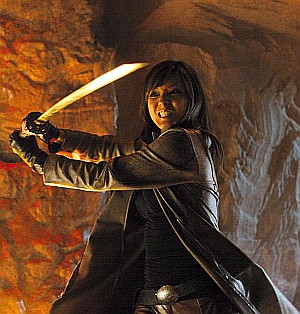 That said, there is a fair amount to enjoy here, with the performances, particularly of Foree and Sawa, being entertaining. Sawa is perfect as a stoner dude who, while initially freaked out for obvious reasons, eventually comes to terms with what’s going on: during the climatic fight between Caitlin and the queen ghoul, he just sits there with a goofy grin on his face, taking it in like we all would. Foree, a horror icon since his performance in Romero’s Dawn of the Dead, also delivers a quirky turn, and there’s a sublime sequence where he and Quinn, both fans of cinematic samurai Zatoichi, imagine what the blind swordsman would do in their shoes. Hu’s role builds gradually throughout the film, and eventually brings this into GWG territory, which I wasn’t expecting initially. She handles the action scenes fairl well, covering all the bases with gunplay, sword skills and martial arts – I note that one of the stuntwomen on the film is Zoe Bell, whom you should remember from her role in Death Proof. If the potential is never fully realized, there is enough going on to make it a pleasant-enough way to spend 85 minutes.
That said, there is a fair amount to enjoy here, with the performances, particularly of Foree and Sawa, being entertaining. Sawa is perfect as a stoner dude who, while initially freaked out for obvious reasons, eventually comes to terms with what’s going on: during the climatic fight between Caitlin and the queen ghoul, he just sits there with a goofy grin on his face, taking it in like we all would. Foree, a horror icon since his performance in Romero’s Dawn of the Dead, also delivers a quirky turn, and there’s a sublime sequence where he and Quinn, both fans of cinematic samurai Zatoichi, imagine what the blind swordsman would do in their shoes. Hu’s role builds gradually throughout the film, and eventually brings this into GWG territory, which I wasn’t expecting initially. She handles the action scenes fairl well, covering all the bases with gunplay, sword skills and martial arts – I note that one of the stuntwomen on the film is Zoe Bell, whom you should remember from her role in Death Proof. If the potential is never fully realized, there is enough going on to make it a pleasant-enough way to spend 85 minutes.
Dir: “Andrew Quint” [but see above]
Star: Kelly Hu, Devon Sawa, Ken Foree, Karen Maxwell
Countdown
★★
“I think the alternate title applies to Petty’s career.”
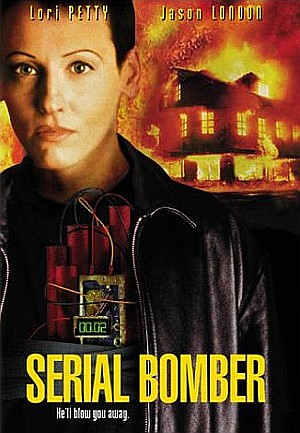 Mad bomber Chris Murdoch (London), is running around Seattle, blowing up Japanese people. FBI agent, Sara Davis (Petty) is part of the team looking into the case, but though they take Murdoch’s Japanese girlfriend (Kawagoe) into custody, Lt Sugimura (Amami) of the Tokyo police sweeps in and demands they release her, so she can be returned home – her father has influence on both sides of the Pacific. Davis won’t let that happen, since the girl is their main hope of catching the bomber; he, needless to say, is none too pleased to find the love of his life in the hands of the police.
Mad bomber Chris Murdoch (London), is running around Seattle, blowing up Japanese people. FBI agent, Sara Davis (Petty) is part of the team looking into the case, but though they take Murdoch’s Japanese girlfriend (Kawagoe) into custody, Lt Sugimura (Amami) of the Tokyo police sweeps in and demands they release her, so she can be returned home – her father has influence on both sides of the Pacific. Davis won’t let that happen, since the girl is their main hope of catching the bomber; he, needless to say, is none too pleased to find the love of his life in the hands of the police.
Based on a Japanese novel, Christmas Apocalype, this is a pedestrian story, not enlivened by anything particularly exciting in the script or from the performances. Petty is hardly a convincing FBI agent, with limbs like twigs, and both Amami and Kawagoe are clearly fresh from their “English as a Foreign Acting Language” classes; while you understand what they’re saying, there isn’t much depth to their performances, in that language, at least. The main problem, however, is that Murdoch’s behaviour makes no sense. The purpose in his original actions is never explained, and he behaves in convoluted ways that are only logical, as far as setting up the cinematic artifice goes.
The best thing I can say about this is, the pyrotechnics crew does a decent job of blowing things up. Otherwise, it’s a mundane time-passer, workmanlike enough on the technical level, that never succeeds in going any deeper than the most superficial level, taking the “cross-cultural cops” idea we’ve seen so often before, and doing nothing with it. It builds to what passes for a climax, at a classical concert: that makes about as little sense as anything which led up to it.
Dir: Keoni Waxman
Star: Lori Petty, Yuki Amami, Jason London, Miwa Kawagoe
a.k.a. Serial Bomber
Return of the Sister Street Fighter
★★
“Maybe she shouldn’t have bothered.”
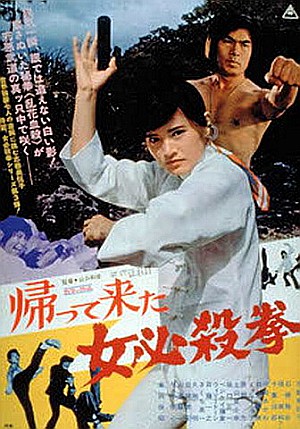 The third in the series loses a lot of the loopy insanity that made the first one such a classic. Shiomi is still as kick-ass a heroine as ever, but I have to say, it was a severe struggle to remain conscious throughout, despite the brief 77-minute running time. By most accounts, the story is largely a re-tread of the second film, with Koryu Lee (Shiomi) going from Hong Kong to Yokohama, to track down a missing woman, only to find herself crossing paths, swords and a variety of other weapons, with local organized crime – since the target of her search is now the mistress of Oh Ryu Mei (Yamamoto). He pits wannabe warriors against each others in death matches, to decide who is fit to become a minion, only to find Lee is more than up to taking them on. He turns to freelancer Kurosaki (Kurata), who agrees to take out the unwanted snooper for twenty million yen.
The third in the series loses a lot of the loopy insanity that made the first one such a classic. Shiomi is still as kick-ass a heroine as ever, but I have to say, it was a severe struggle to remain conscious throughout, despite the brief 77-minute running time. By most accounts, the story is largely a re-tread of the second film, with Koryu Lee (Shiomi) going from Hong Kong to Yokohama, to track down a missing woman, only to find herself crossing paths, swords and a variety of other weapons, with local organized crime – since the target of her search is now the mistress of Oh Ryu Mei (Yamamoto). He pits wannabe warriors against each others in death matches, to decide who is fit to become a minion, only to find Lee is more than up to taking them on. He turns to freelancer Kurosaki (Kurata), who agrees to take out the unwanted snooper for twenty million yen.
While certainly possessing its surreal moments – such as the sudden realization that the sexy tune being played in the background at a strip club is, er, Danny Boy – there isn’t the same sense of unfettered imagination. And while the lack of editing during the fight sequences is a refreshing contrast to modern techniques, the alternative favoured by Yamaguchi involves a lot of hand-held camera. Unfortunately, it does not appear that the steadicam had yet made its way to Japan, and the results are disjointed, with Shiomi shining despite of, rather than because of, the presentation. Her skills with the nunchakus are particularly impressive, even if the fight in which she uses them largely consists of a pose-off with the weapons. It’s a significantly less-entertaining piece of work than the original, and that’s a shame.
Dir: Kazuhiko Yamaguchi
Star: Etsuko Shihomi (Sue Shiomi), Akane Kawasaki, Yasuaki Kurata, Rinichi Yamamoto




